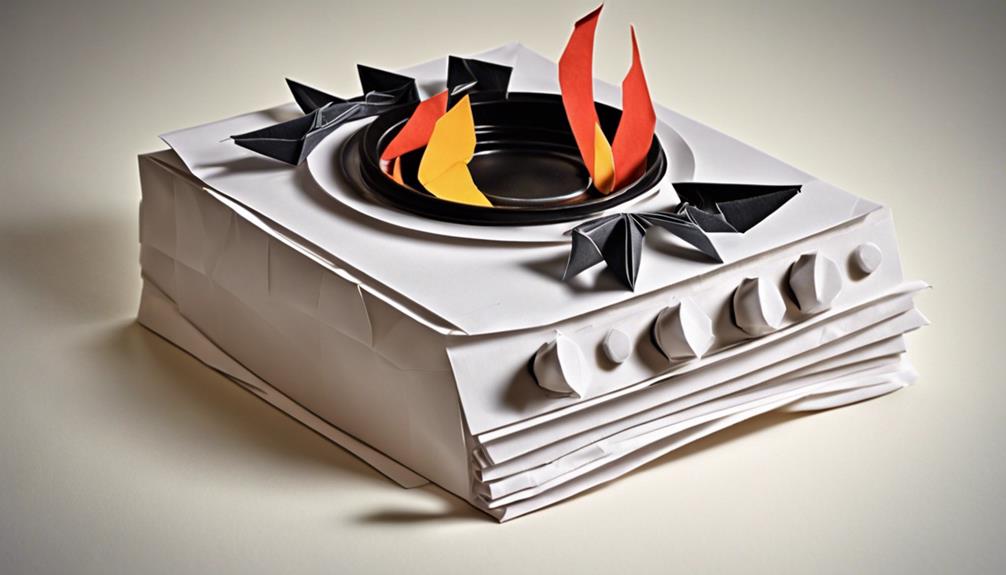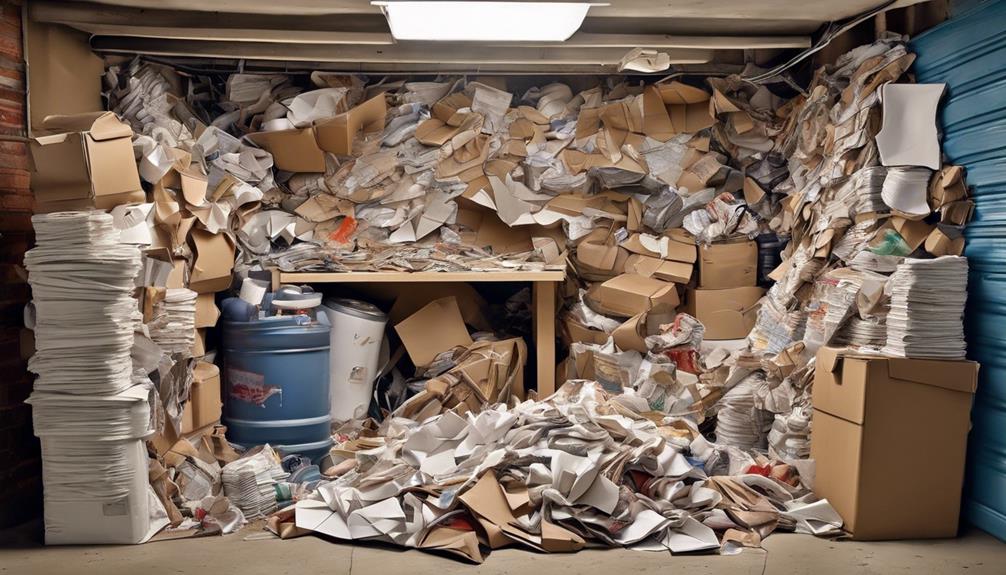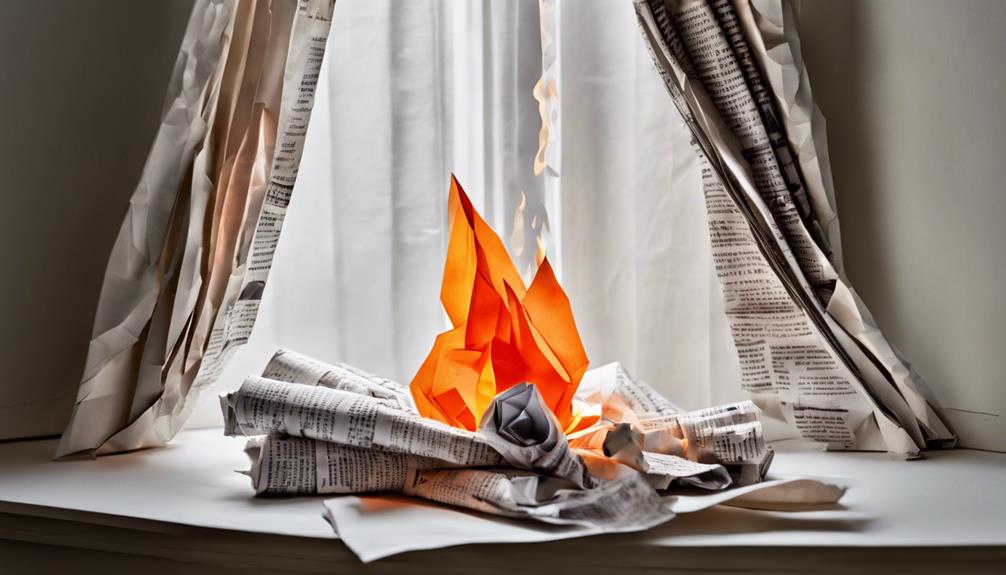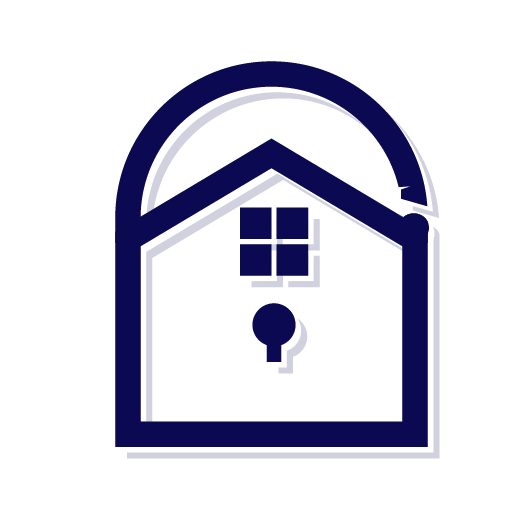As you go about your daily routines at home, have you ever stopped to consider the potential fire hazards lurking in your living space? From the sizzle of a forgotten stove burner to the flicker of an unsupervised candle, the risks are often closer than you think. It's crucial to stay vigilant and address these hazards before they escalate into dangerous situations.
Kitchen Stove and Cooking Appliances

When using your kitchen stove and cooking appliances, always remember to keep flammable items away from heat sources. Stove maintenance is crucial for safety, so make sure to clean your stove regularly to prevent grease buildup that can ignite a fire. Check for any gas leaks or faulty electrical connections to avoid potential hazards.
To prevent cooking fires, never leave your stove unattended while cooking, especially when using high heat. Keep a fire extinguisher in your kitchen and know how to use it in case of emergencies. It's also essential to have a smoke alarm installed near the kitchen to provide early detection of any potential fires.
Avoid wearing loose-fitting clothing while cooking as it can easily catch fire. Use pot holders or oven mitts to handle hot pots and pans to prevent burns. Remember to turn off the stove after use and double-check that all burners are off to avoid accidental fires. By following these cooking fire prevention tips, you can ensure a safe and enjoyable cooking experience in your home.
Electrical Outlets and Wiring
Regularly inspecting your electrical outlets and wiring is essential to prevent potential fire hazards in your home. Ensuring the safety of your electrical system involves both outlet maintenance and wiring inspection. Here are some key points to keep in mind:
| Outlet Maintenance | Wiring Inspection |
|---|---|
| Check for any loose outlets or | Look for any exposed or damaged wiring. |
| Ensure outlets are not overloaded. | Verify that wires are not frayed or worn. |
| Avoid using outlet extenders. | Inspect for any signs of overheating. |
To maintain the safety of your electrical outlets, refrain from using damaged outlets and avoid overloading them with multiple devices. When inspecting your wiring, pay close attention to any exposed wires or signs of wear and tear, as these can pose serious fire risks. Taking these precautions can help prevent electrical fires and keep your home safe.
Flammable Materials and Clutter

You'll want to pay close attention to the clutter in your home as it can pose a significant fire hazard. Properly storing flammable materials like gasoline, paint, and cleaning products is crucial to prevent accidental fires. Take the time to clear out any unnecessary items and ensure that what you do keep is stored safely to reduce the risk of a fire starting.
Clearing Clutter for Safety
To enhance the safety of your home, it is crucial to promptly remove any clutter that includes flammable materials. Safety hazards lurk in piles of old newspapers, magazines, or cardboard boxes that can easily catch fire. Clutter prevention starts with decluttering these items from your living spaces, especially from areas near heat sources like stoves or heaters. Take the time to sort through your belongings, discarding any unnecessary items and organizing the rest. Keep highly flammable materials like paper or fabric away from potential ignition sources to reduce the risk of a fire starting in your home. By maintaining a clutter-free environment, you are taking a proactive step in ensuring the safety of your household.
Proper Storage of Materials
To ensure the safety of your home, it is imperative to store flammable materials and clutter properly to minimize the risk of fire hazards. When it comes to chemical storage, always keep them in their original containers with tight lids and store them in well-ventilated areas away from heat sources. Check the labels for any specific storage instructions. Additionally, proper garage organization is crucial. Ensure flammable liquids like gasoline are stored in approved containers and kept away from any ignition sources. Clear out any unnecessary clutter to prevent fires from spreading quickly. Consider installing shelving units to keep items off the floor and maintain a clear pathway. By following these storage practices, you can significantly reduce the chances of a fire starting in your home.
Heating Equipment
When it comes to heating equipment in your home, ensuring proper ventilation is crucial for safe operation. Regular maintenance checks on your heating systems can help prevent potential fire hazards. Stay proactive by scheduling professional inspections to keep your heating equipment in top condition.
Proper Ventilation
Proper ventilation is essential for maintaining safe operation of your home's heating equipment. Ensuring adequate airflow around heating appliances helps prevent the buildup of potentially dangerous gases like carbon monoxide. Here are some tips to improve ventilation and air quality in your home:
- Clean Air Ducts Regularly: Dust and debris can accumulate in air ducts, hindering proper airflow.
- Use Exhaust Fans: When cooking or showering, turn on exhaust fans to vent out excess moisture and fumes.
- Open Windows: Allow fresh air to circulate by opening windows for a few minutes each day.
- Install Carbon Monoxide Detectors: Place detectors near sleeping areas to alert you of any dangerous levels of this odorless gas.
- Schedule Professional Inspections: Regular maintenance checks by HVAC professionals can ensure optimal ventilation and heating system operation.
Maintenance Checks
Ensuring the regular maintenance of your home's heating equipment is crucial for safe and efficient operation. Conducting routine maintenance checks on your heating system can help prevent potential fire hazards. Start by scheduling an annual roof inspection to ensure there are no leaks or blockages that could affect your heating equipment. Additionally, chimney cleaning is essential to remove any buildup of creosote or debris that could ignite and cause a fire. By staying proactive with these maintenance tasks, you can enjoy a warm and cozy home while minimizing the risk of fire hazards. Remember, a well-maintained heating system is not only efficient but also safe for you and your loved ones.
Candles and Open Flames

To prevent accidents, always extinguish candles and open flames before leaving a room or going to bed. Fire safety is crucial when using candles and open flames in your home. Here are some essential tips to help you prevent fire hazards:
- Keep candles away from flammable materials: Ensure there are no curtains, papers, or any other flammable items close to the candle.
- Use candle alternatives: Consider using flameless LED candles or battery-operated lights as a safer option.
- Place candles on stable surfaces: Always place candles on sturdy, heat-resistant surfaces to prevent them from tipping over.
- Never leave candles unattended: Make sure someone is always present in the room when candles are lit.
- Keep candles out of reach of children and pets: Avoid placing candles where they can be knocked over by curious little hands or playful pets.
Smoking in the Home
When smoking in the home, always ensure proper disposal of cigarette butts in designated ashtrays to reduce the risk of fire hazards. Secondhand smoke risks are not only detrimental to your health but can also pose a significant danger in terms of fire safety. To practice fire safe smoking habits, make sure to never smoke in bed or when drowsy, as a dropped cigarette can easily ignite bedding or furniture. It is crucial to keep lighters and matches out of reach of children and pets to prevent accidental fires. Additionally, avoid smoking near flammable materials such as curtains, upholstery, or papers. Regularly clean out ashtrays to prevent overflowing ash that could potentially ignite. Lastly, never leave a lit cigarette unattended, even for a short period. By following these guidelines and being mindful of the potential fire hazards associated with smoking indoors, you can create a safer environment for yourself and your loved ones.
Frequently Asked Questions
How Can I Prevent Fires While Using Candles and Open Flames in My Home?
When using candles and open flames, preventing fires is crucial. Place fire extinguishers strategically for quick access. Always follow safety tips, like never leaving flames unattended. Consider candle alternatives such as flameless options for a safer choice. By being mindful of fire hazards and taking precautions, you can enjoy the ambiance of candles without risking a fire. Stay safe and keep your home secure from potential fire dangers.
What Are Some Common Fire Hazards Associated With Smoking in the Home?
When smoking indoors, make sure you have proper ventilation to reduce the risk of fires. Always extinguish cigarettes completely in designated ashtrays. Avoid smoking in bed or when drowsy to prevent accidental fires. Ensure your smoke alarms are working correctly to alert you to any potential dangers. Regularly clean out ashtrays and dispose of cigarette butts safely. By being mindful and taking precautions, you can minimize the fire hazards associated with smoking in your home.
Are There Any Specific Safety Precautions to Take When Using Heating Equipment?
When using heating equipment, it's crucial to take specific safety precautions. Space heaters should always be placed on a level, non-flammable surface and kept at least three feet away from anything that can catch fire. Additionally, ensure that fireplaces have a sturdy screen to prevent sparks from flying out. Remember, safety first when it comes to heating your home to avoid potential fire hazards.
How Can I Reduce the Risk of Fires Related to Flammable Materials and Clutter in My Home?
To reduce fire risks from flammable materials and clutter in your home, keep kitchen appliances clean and away from towels or wooden utensils. Check outdoor grills for grease buildup and position them away from structures. Store flammable items like gasoline in a safe place, and declutter regularly to prevent fires from spreading. Stay vigilant and proactive in maintaining a safe environment to minimize fire hazards.
Are There Any Warning Signs to Look Out for That Indicate Potential Electrical Hazards in My Home?
When it comes to electrical maintenance, you must stay vigilant for warning signs that could indicate potential hazards in your home. Look out for flickering lights, outlets that are warm to the touch, or frequently tripped circuit breakers. These are all red flags that require attention. Taking proactive safety measures like having a professional inspect your wiring can prevent hazards and ensure your home's electrical system is in top shape.



